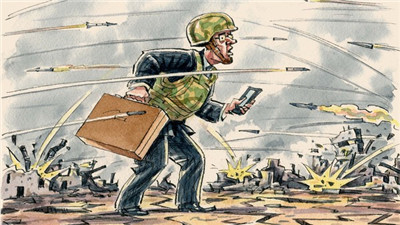(单词翻译:单击)
The west has a new industry. It is the booming business of calculating geopolitical risk. Glance around the world at the fires burning in the Middle East, at Russia’s march into Ukraine and the tensions in East Asia fuelled by China’s rise, and it is easy to see why. These conflicts and collisions are more than an unhappy coincidence. The end of history has made way for the era of systemic disorder.
西方出现了一个新行业——蒸蒸日上的地缘政治风险评估生意。环顾世界,中东战火不断、俄罗斯入侵乌克兰以及中国崛起加剧东亚紧张局势,造成这种局面的原因不难理解。这些冲突与碰撞不仅仅是令人遗憾的巧合。历史的终结已让位给系统性混乱的时代。

Sitting in the other day at a conference organised by two leading think-tanks — Aspen Italia and Chatham House — it occurred to me that when historians cast around for a title for the present chapter in global affairs, they might do worse than opt for “the great unwinding”. The backdrop for the gathering of business leaders and policy makers was the glorious tranquillity of Venice. The talk was about the ruptures that have brought down the post-cold war order.
上个月,我出席了意大利阿斯平研究所(Aspen Italia Institute)和英国皇家国际事务研究所(Chatham House)这两家领先智库组织的一场会议。在会上我突然想到,当历史学家为当前国际局势的章节寻找标题时,或许没有比“大失控”更贴切的选择了。商界领袖和政策制定者是在明媚而宁静的威尼斯举行这场会议的,主题是摧毁了冷战后秩序的“断层”。
The optimism in the west that greeted the collapse of communism was rooted in a clutch of organising assumptions. The world has become a more dangerous and unpredictable place during the intervening 25 years because most of these suppositions have now unwound.
西方对共产主义的崩溃感到欢欣鼓舞,这种乐观情绪根植于几条组织方面的假设。自那以来的25年里,世界已变得更加危险和不可预测,因为这些假设中的大部分如今已不成立。
The first was the permanence of the Pax Americana. Remember the breathless commentary about the impregnable hegemony of the US? At the turn of the millennium Washington assumed, and most experts concurred, that the sole superpower would set the terms of international relations for most of the 21st century. There would be adjustments to accommodate the new powers, but the US would continue to act as guarantor of the peace.
第一条假设是“美国治下的和平”(Pax Americana)将永远持续下去。记得有关美国霸权牢不可破那种令人窒息的评论吗?在世纪交替之际,华盛顿方面想当然地觉得,在21世纪的大部分时间里,美国这个唯一的超级大国将制定国际关系的规则——大多数专家对此表示同意。规则将会适当调整以适应新兴大国的崛起,但美国将继续充当和平的守护者。
The historians no doubt will debate when precisely the illusion was shattered. The chaos that followed shock and awe in Iraq is a good a point as any. The wars in Afghanistan and Iraq ultimately drew the limits of US power, and did so just at the moment that China, India and the rest were rising fast. The war on terror did more than delineate the shortcomings of military might. Abu Ghraib and Guantánamo shattered the notion that America would always act as a benign hegemon.
毫无疑问,历史学家们将会激辩这一幻觉究竟在何时破灭。美国在伊拉克发起震慑行动之后的混乱,就是一个最恰当的时间点。阿富汗和伊拉克两场战争最终使美国的力量绷紧到了极限,与此同时,中国、印度以及其他国家却在迅速崛起。反恐战争不只是暴露出军力的不足。阿布格莱布(Abu Ghraib)和关塔那摩(Guantánamo)两所监狱让美国将会永远充当仁慈霸主的想法化为泡影。
US declinism can be overdone. In an excellent new essay asking Is the American Century Over?, the Harvard scholar Joseph Nye points up America’s enduring strengths — economic, demographic and geographic as well as military. It is also salutary to note how quickly the shale revolution has overturned many predictions of ebbing US power. What is true, though, is that the US of the 21st century is unlikely to possess the capacity or the will to shape the geopolitical order in the way it did in the 20th. For all the noise now being made by Republicans in Congress, future presidents will be obliged to follow President Barack Obama in recognising the constraints of a multipolar world.
说美国已经衰落可能有些过头。在一本名为《美国世纪结束了吗?》(Is the American Century Over?)的杰出的新书中,美国哈佛大学学者约瑟夫•奈(Joseph Nye)强调了美国在经济、人口、地理和军事方面的持久优势。另外有必要指出的是,页岩气革命是多么迅速地推翻了众多关于美国实力衰落的预言。不过,21世纪的美国不太可能拥有像其在20世纪塑造地缘政治秩序那样的能力或意愿,这也是实情。不管共和党人在国会怎么喧嚣,未来的美国总统都不得不仿效巴拉克•奥巴马(Barack Obama),承认多极世界的种种约束。
The second unwinding has been in Europe. The creation of the euro was intended to complete the work of the EU’s founding fathers, replacing the deep scars of competing nationalisms with a postmodern model of deep integration. Europe’s borders had been fixed in perpetuity and the continent had said goodbye to war.
第二项失控发生在欧洲。创立欧元的本意是为了完成欧盟(EU)创始人的工作,以深度融合的后现代模式取代民族主义相互对抗的深深伤疤。欧洲国家的边界被永久性地固定下来,欧洲已告别了战争。
The thought, too, was that Europe’s postwar model would be exported, first to the EU’s neighbours in the east and then as a template for the rising world. For a while it worked: a procession of once-communist states queuing to join the democratic club testified to the potency of normative power. There was something to be said for playing Venus to America’s Mars.
这种想法也意味着,欧洲的战后模式将被输出,首先输出至欧洲东部邻国,然后成为新兴世界的样板。该想法一度是有效的:众多前共产主义国家排队要求加入欧盟这个验证过规范型权力效力的民主俱乐部。以欧洲的“金星”对抗美国的“火星”一定程度上不无道理。
And now? The euro has been exposed as a half-finished project, a statement of intent that lacks vital political and economic underpinnings. Even after the crisis of recent years, and I am still not convinced Greece can remain in the euro, governments are reluctant to pool sufficient sovereignty to assure the single currency’s long-term future. The resurgence of nationalism is not confined to arguments about debt and deficits. Populists of left and right have prospered across Europe by demanding governments slam the door against the alleged depredations of globalisation.
现在情况如何呢?欧元已被曝光为一个半吊子工程,不过是一份缺乏关键政治与经济基础支持的意向书。即便在近几年的危机之后——现在我仍不确定希腊能否留在欧元区——欧洲各国政府还是不愿让渡足够多的主权以保证欧元的长远未来。民族主义的再度兴起不仅仅是因为债务与赤字争论的影响。左右翼民粹势力要求政府对所谓的全球化掠夺关上大门,在欧洲各地迅猛发展。
There lies the third unwinding — of the assumption that economic interdependence would soften national competition and that global supply chains would beget more effective global governance. Instead we have seen the return of nationalist competition, in Russian President Vladimir Putin’s revanchism, and in the territorial disputes between China and its neighbours in the East and China seas.
第三项不成立的假设是,经济上的相互依赖将削弱国家间的竞争,同时全球供应链将带来更有效的全球治理。相反,我们看到了民族主义竞争的回归,比如俄罗斯总统弗拉基米尔•普京(Vladimir Putin)的复仇主义,以及中国与其邻国在东中国海和南中国海上的领土纠纷。
If the Europeans are having second thoughts about postmodern integration, most of the rising — and in Russia’s case, declining — powers never signed up to the idea of sharing national sovereignty. The threat in the Middle East and parts of Africa comes from collapsing states; in Asia it is rooted in competition between states.
如果欧洲人重新考虑一下后现代融合,就会发现大多数兴起中的大国(俄罗斯则是衰退中的大国)从未支持过共享国家主权的主张。在中东和非洲部分地区,威胁来自于濒临崩溃的国家;在亚洲,威胁根植于国家间的竞争。
So how should business respond to this increase in political risk? Many still choose to ignore it: [words missing here could you expand pls?]they worry instead about competitors’ pricing, economic growth and regulation. Investors in, and exporters to, Russia have learnt that complacency can carry a cost.
那么,企业应当如何应对这种不断加剧的政治风险?许多企业仍选择忽视此种风险:它们担心的反而是竞争对手的定价、经济增长和监管。投资于俄罗斯的投资者以及向俄罗斯出口的企业已意识到,自满可能让人付出代价。
As they operate their multi-nation supply chains and just-in-time production processes, businesses should understand that the world has changed. The cold war era was dangerous but stable. The great unwinding has created a world that is dangerously unpredictable. If there is money to be made in calculating geopolitical risk, there is money to be saved in understanding it.
在经营跨国供应链和适时生产流程时,企业应当明白,世界已经发生了改变。冷战时代危险,但稳定。大失控造就了一个危险而不可预测的世界。如果计算地缘政治风险可以赚钱的话,那么明白这种风险就能省钱。


